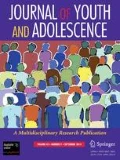Abstract
A new inventory for examining the first six of Erikson's psychosocial stages is described. The self-report questionnaire, developed in a pilot study of 97 adolescents and tested in a study of 622 adolescents, has 12 items for each subscale. Measures of reliability and validity are reported. It is concluded that the Erikson Psychosocial Stage Inventory (EPSI) is a useful measure for researchers interested in development from early adolescence and in mapping changes as a function of life events.
Similar content being viewed by others
References
Bourne, E. (1978a). The state of research on ego identity: A review and appraisal. Part I.J. Youth Adoles. 7: 223–251.
Bourne, E. (1978b). The state of research on ego identity: A review and appraisal. Part II.J. Youth Adoles. 7: 371–392.
Ciacco, N. V. (1971). A test of Erikson's theory of ego epigenesis.Dev. Psychol. 4: 306–311.
Constantinople, A. (1969). An Eriksonian measure of personality development in college students.Dev. Psychol. 1: 357–372.
Cross, H., and Allen, J. (1970). Ego identity status adjustment and academic achievement.J. Consult. Clin. Psychol. 34: 288.
Edwards, A. L. (1954).Edwards manual for the Personal Preference Schedule, Psychological Corporation, New York.
Enright, R. D., Lapsley, D. K., Drivas, A. E., and Fehr, L. A. (1980). Parental influences on the development of adolescent autonomy and identity.J. Youth Adoles. 9: 529–545.
Erikson, E. H. (1959). Identity and the life cycle.Psychol. Iss. 1: 1–71.
Erikson, E. H. (1963).Childhood and Society, Norton, New York.
Erikson, E. H. (1968).Identity: Youth and Crisis, Norton, New York.
Greenberger, E., and Sorensen, A. B. (1974). Toward a concept of psychosocial maturity.J. Youth Adoles. 3: 329–358.
Gurney, R. M. (1980). The effects of unemployment on the psychosocial development of school-leavers.J. Occupat. Psychol. 53: 205–213.
Hodgson, J. W., and Fischer, J. L. (1979). Sex differences in identity and intimacy development in college youth.J. Youth Adoles. 8: 37–50.
La Voie, J. C. (1976). Ego identity formation in middle adolescence.J. Youth Adoles. 5: 371–385.
Marcia, J. E. (1966). Development and validation of ego identity status.J. Personal. Soc. Psychol. 3: 551–558.
Marcia, J. E. (1976). Identity six years after: A follow-up study.J. Youth Adoles. 5: 145–150.
Marcia, J. E., and Friedman, M. L. (1970). Ego identity status in college women.J. Personal. 38: 149–263.
Matteson, D. R. (1974).Alienation vs. Exploration and Commitment: Personality and Family Correlaries of Adolescent Identity Statuses, Ungdom, Sforskning, Copenhagen.
Offer, D. (1969).The Psychological World of the Teenager, Basic Books, New York.
Orlofsky, J. L. (1978). Identity formation, achievement and fear of success in college men and women.J. Youth Adoles. 7: 49–62.
Podd, M. H. (1972). Ego identity status and morality: The relationship between the two constructs.Dev. Psychol. 6: 497–507.
Prelinger, E., and Zimet, C. N. (1964).An Ego-Psychological Approach to Character Assessment, Free Press, London.
Rasmussen, J. E. (1964). Relationship of ego identity to psychosocial effectiveness.Psychol. Rep. 15: 815–825.
Wessman, A. E., and Ricks, D. F. (1966).Mood and Personality, Holt, Rinehart and Winston, New York.
Author information
Authors and Affiliations
Additional information
This research was supported by a grant from the Education Research and Development Committee.
Received Ph.D. from University of Melbourne. Current research interests are adolescent adjustment, ethnicity, and sex-role psychology.
Received Ph.D. from University of Melbourne. Current research interests are effects of unemployment and adolescent adjustment.
Received Ph.D. from Florida State University. Current research interests are sex-role psychology and adolescence.
Rights and permissions
About this article
Cite this article
Rosenthal, D.A., Gurney, R.M. & Moore, S.M. From trust on intimacy: A new inventory for examining erikson's stages of psychosocial development. J Youth Adolescence 10, 525–537 (1981). https://doi.org/10.1007/BF02087944
Received:
Issue Date:
DOI: https://doi.org/10.1007/BF02087944




